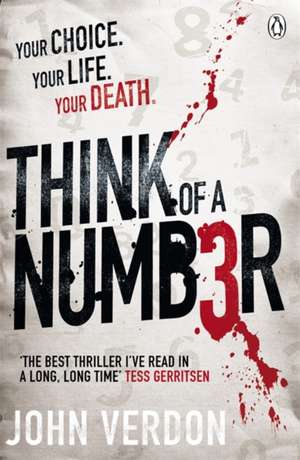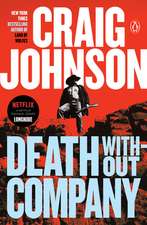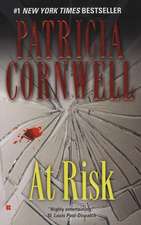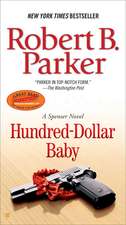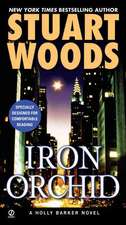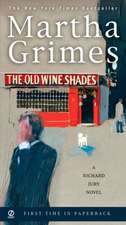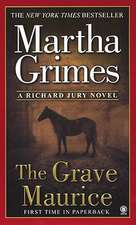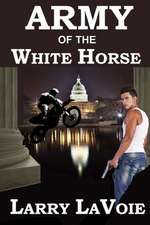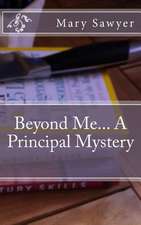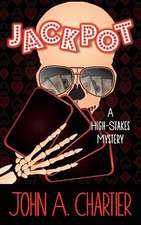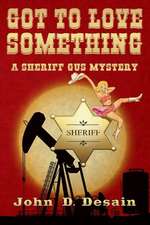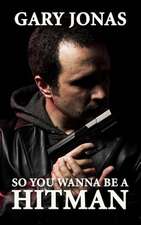Think of a Number
Autor John Verdonen Limba Engleză Paperback – 4 aug 2010
The letter contains a request - think of a number, any number - and a sealed envelope.
And inside the envelope is that number.
When Dave Gurney, retired NYPD homicide detective, is contacted by an old college acquaintance about some startling letters he's been receiving, he thinks it's little more than a diverting but sinister puzzle.
That is, until the acquaintance is brutally killed.
Suddenly Gurney finds himself in the middle of a murder investigation that makes no sense.
Because the killer seems to have known his victim intimately - how else was he able to predict his victim's thoughts, even his actions? How did he know his darkest secrets?
The killer is smart, and he is playing with the police.
But Gurney needs to be smarter.
This is only the beginning. And the killer alone knows where it will end.
Fans of Harlan Coben and Linwood Barclay will love this unique and chilling high-concept thriller.
Praise for John Verdon:
'The best thriller I've read in a long, long time'Tess Gerritsen
'Wow! Totally absorbing, brilliantly written. The best book I've read this year'Sun
| Toate formatele și edițiile | Preț | Express |
|---|---|---|
| Paperback (2) | 70.54 lei 24-30 zile | +27.16 lei 5-11 zile |
| Penguin Books – 4 aug 2010 | 70.54 lei 24-30 zile | +27.16 lei 5-11 zile |
| BROADWAY BOOKS – 31 mai 2012 | 131.94 lei 3-5 săpt. |
Preț: 70.54 lei
Preț vechi: 83.29 lei
-15% Nou
Puncte Express: 106
Preț estimativ în valută:
13.50€ • 14.13$ • 11.17£
13.50€ • 14.13$ • 11.17£
Carte disponibilă
Livrare economică 20-26 martie
Livrare express 01-07 martie pentru 37.15 lei
Preluare comenzi: 021 569.72.76
Specificații
ISBN-13: 9780141048703
ISBN-10: 0141048700
Pagini: 512
Dimensiuni: 129 x 198 x 30 mm
Greutate: 0.35 kg
Editura: Penguin Books
Colecția Penguin
Locul publicării:London, United Kingdom
ISBN-10: 0141048700
Pagini: 512
Dimensiuni: 129 x 198 x 30 mm
Greutate: 0.35 kg
Editura: Penguin Books
Colecția Penguin
Locul publicării:London, United Kingdom
Notă biografică
John
Verdon,
a
former
Manhattan
advertising
executive,
lives
with
his
wife
on
a
small
hilltop
in
upstate
New
York.
His
first
two
Dave
Gurney
novels
areThink
of
a
NumberandShut
Your
Eyes
Tight.
Recenzii
Written
with
pace,
style,
intelligence,
teasing
puzzles
and
lots
of
tension.The
number
I'm
thinking
of
is
1!
Addictive and thoroughly engrossing . . . this tale will grab hold of you like a steel jaw trap
Spectacular and mind-bending . . . the best thriller I've read in a long, long time. John Verdon's writing is so polished, so nuanced, it makes me envious that I didn't write this terrific novel
John Verdon has written a flawless novel about flawed people and he's written it beautifully
With its edge-of-the-chair suspense, memorable characters that jump off the pages, and elegant and deft writing, John Verdon'sThink of a Numberis a stunning debut
One of the finest thrillers I've read in years. I devoured it. In a genre frequently and sadly known for delivering more of the same old familiar stuff,Think of a Numberstands out as original and exciting
Simply one of the best thrillers I've read in a lifetime of thriller reading - eloquent, heart-rending, deeply suspenseful on many levels, and relentlessly intelligent. Absolutely not to be missed!
Addictive and thoroughly engrossing . . . this tale will grab hold of you like a steel jaw trap
Spectacular and mind-bending . . . the best thriller I've read in a long, long time. John Verdon's writing is so polished, so nuanced, it makes me envious that I didn't write this terrific novel
John Verdon has written a flawless novel about flawed people and he's written it beautifully
With its edge-of-the-chair suspense, memorable characters that jump off the pages, and elegant and deft writing, John Verdon'sThink of a Numberis a stunning debut
One of the finest thrillers I've read in years. I devoured it. In a genre frequently and sadly known for delivering more of the same old familiar stuff,Think of a Numberstands out as original and exciting
Simply one of the best thrillers I've read in a lifetime of thriller reading - eloquent, heart-rending, deeply suspenseful on many levels, and relentlessly intelligent. Absolutely not to be missed!
Extras
Chapter 1
Cop art
Jason Strunk was by all accounts an inconsequential fellow, a bland thirty-something, nearly invisible to his neighbors--and apparently inaudible as well, since none could recall a single specific thing he'd ever said. They couldn't even be certain that he'd ever spoken. Perhaps he'd nodded, perhaps said hello, perhaps muttered a word or two. It was hard to say.
All expressed a conventional initial amazement, even a temporary disbelief, at the revelation of Mr. Strunk's obsessive devotion to killing middle-aged men with mustaches and his uniquely disturbing way of disposing of the bodies: cutting them into manageable segments, wrapping them colorfully, and mailing them to local police officers as Christmas presents.
Dave Gurney gazed intently at the colorless, placid face of Jason Strunk--actually, the original Central Booking mug shot of Jason Strunk--that stared back at him from his computer screen. The mug shot had been enlarged to make the face life-size, and it was surrounded at the borders of the screen by the tool icons of a creative photo-retouching program that Gurney was just starting to get the hang of.
He moved one of the brightness-control tools on the screen to the iris of Strunk's right eye, clicked his mouse, and then examined the small highlight he'd created.
Better, but still not right.
The eyes were always the hardest--the eyes and the mouth--but they were the key. Sometimes he had to experiment with the position and intensity of one tiny highlight for hours, and even then he'd end up with something not quite what it should be, not good enough to show to Sonya, and definitely not Madeleine.
The thing about the eyes was that they, more than anything else, captured the tension, the contradiction--the uncommunicative blandness spiked with a hint of cruelty that Gurney had often discerned in the faces of murderers with whom he'd had the opportunity to spend quality time.
He'd gotten the look right with his patient manipulation of the mug shot of Jorge Kunzman (the Walmart stock clerk who always kept the head of his last date in his refrigerator until he could replace it with one more recent). He'd been pleased with the result, which conveyed with disturbing immediacy the deep black emptiness lurking in Mr. Kunzman's bored expression, and Sonya's excited reaction, her gush of praise, had solidified his opinion. It was that reception, plus the unexpected sale of the piece to one of Sonya's collector friends, that motivated him to produce the series of creatively doctored photographs now being featured in a show headlined Portraits of Murderers by the Man Who Caught Them, in Sonya's small but pricey gallery in Ithaca.
How a recently retired NYPD homicide detective with a yawning uninterest in art in general and trendy art in particular, and a deep distaste for personal notoriety, could have ended up as the focus of a chic university-town art show described by local critics as "a cutting-edge blend of brutally raw photographs, unflinching psychological insights, and masterful graphic manipulations" was a question with two very different answers: his own and his wife's.
As far as he was concerned, it all began with Madeleine's cajoling him into taking an art-appreciation course with her at the museum in Cooperstown. She was forever trying to get him out--out of his den, out of the house, out of himself, just out. He'd learned that the best way to stay in control of his own time was through the strategy of periodic capitulations. The art-appreciation course was one of these strategic moves, and although he dreaded the prospect of sitting through it, he expected it to immunize him against further pressures for at least a month or two. It wasn't that he was a couch potato--far from it. At the age of forty-seven, he could still do fifty push-ups, fifty chin-ups, and fifty sit-ups. He just wasn't very fond of going places.
The course, however, turned out to be a surprise--in fact, three surprises. First, despite his pre-course assumption that his greatest challenge would be staying awake, he found the instructor, Sonya Reynolds, a gallery owner and artist of regional renown, riveting. She was not conventionally beautiful, not in the archetypal Northern European Catherine Deneuve mode. Her mouth was too pouty, her cheekbones overly prominent, her nose too strong. But somehow the imperfect parts were unified into a uniquely striking whole by large eyes of a deep smoky green and by a manner that was completely relaxed and naturally sensual. There were not many men in the class, just six of the twenty-six attendees, but she had the absolute attention of all six.
The second surprise was his positive reaction to the subject matter. Because it was a special interest of hers, Sonya devoted considerable time to art derived from photography--photography that had been manipulated to create images that were more powerful or communicative than the originals.
The third surprise came three weeks into the twelve-week course, on the night that she was commenting enthusiastically on a contemporary artist's silk-screen prints derived from solarized photographic portraits. As Gurney gazed at the prints, the idea came to him that he could take advantage of an unusual resource to which he had special access and to which he could bring a special perspective. The notion was strangely exciting. The last thing he'd expected from an art-appreciation course was excitement.
Once this occurred to him--the concept of enhancing, clarifying, intensifying criminal mug shots, particularly the mug shots of murderers, in ways that would capture and convey the nature of the beast he had spent his career studying, pursuing, and outwitting--it took hold, and he thought about it more often than he would have been comfortable admitting. He was, after all, a cautious man who could see both sides of every question, the flaw in every conviction, the naivete in every enthusiasm.
As Gurney worked at the desk in his den that bright October morning on the mug shot of Jason Strunk, the pleasant challenge of the process was interrupted by the sound of something being dropped on the floor behind him.
"I'm leaving these here," said Madeleine Gurney in a voice that to anyone else might have sounded casual but to her husband was fraught.
He looked over his shoulder, his eyes narrowing at the sight of the small burlap sack leaning against the door. "Leaving what?" he asked, knowing the answer.
"Tulips," said Madeleine in the same even tone.
"You mean bulbs?"
It was a silly correction, and they both knew it. It was just a way of expressing his irritation at Madeleine's wanting him to do something he didn't feel like doing.
"What do you want me to do with them in here?"
"Bring them out to the garden. Help me plant them."
He considered pointing out the illogic of her bringing into the den something for him to bring back out to the garden but thought better of it.
"As soon as I finish with this," he said a little resentfully. He realized that planting tulip bulbs on a glorious Indian-summer day in a hilltop garden overlooking a rolling panorama of crimson autumn woods and emerald pastures under a cobalt sky was not a particularly onerous assignment. He just hated being interrupted. And this reaction to interruption, he told himself, was a by-product of his greatest strength: the linear, logical mind that had made him such a successful detective--the mind that was jarred by the slightest discontinuity in a suspect's story, that could sense a fissure too tiny for most eyes to see.
Madeleine peered over his shoulder at the computer screen. "How can you work on something so ugly on a day like this?" she asked.
Chapter 2
A perfect victim
David and Madeleine Gurney lived in a sturdy nineteenth-century farmhouse, nestled in the corner of a secluded pasture at the end of a dead-end road in the Delaware County hills five miles outside the village of Walnut Crossing. The ten-acre pasture was surrounded by woods of cherry, maple, and oak.
The house retained its original architectural simplicity. During the year they'd owned it, the Gurneys had restored to a more appropriate appearance the previous owner's unfortunate updates--replacing, for example, bleak aluminum windows with wood-framed versions that possessed the divided-light style of an earlier century. They did it not out of a mania for historical authenticity but in recognition that the original aesthetics had somehow been right. This matter of how one's home should look and feel was one of the subjects on which Madeleine and David were in complete harmony--a list that, it seemed to him, had lately been shrinking.
This thought had been eating like acid at his mood most of the day, activated by his wife's comment about the ugliness of the portrait he was working on. It was still at the edge of his consciousness that afternoon when, dozing in his favorite Adirondack chair after the tulip-planting activity, he became aware of Madeleine's footsteps brushing toward him through the ankle-high grass. When the footsteps stopped in front of his chair, he opened one eye.
"Do you think," she said in her calm, light way, "it's too late to take the canoe out?" Her voice positioned the words deftly between a question and a challenge.
Madeleine was a slim, athletic forty-five-year-old who could easily be mistaken for thirty-five. Her eyes were frank, steady, appraising. Her long brown hair, with the exception of a few errant strands, was pulled up under her broad-brimmed straw gardening hat.
He responded with a question from his own train of thought. "Do you really think it's ugly?"
"Of course it's ugly," she said without hesitation. "Isn't it supposed to be?"
He frowned as he considered her comment. "You mean the subject matter?" he asked.
"What else would I mean?"
"I don't know." He shrugged. "You sounded a bit contemptuous of the whole thing--the execution as well as the subject matter."
"Sorry."
She didn't seem sorry. As he teetered on the edge of saying so, she changed the subject.
"Are you looking forward to seeing your old classmate?"
"Not exactly," he said, adjusting the reclining back of his chair a notch lower. "I'm not big on recollections of times past."
"Maybe he's got a murder for you to solve."
Gurney looked at his wife, studied the ambiguity of her expression. "You think that's what he wants?" he asked blandly.
"Isn't that what you're famous for?" Anger was beginning to stiffen her voice.
It was something he'd witnessed in her often enough in recent months that he thought he understood what it was about. They had different notions of what his retirement from the job was supposed to mean, what kind of changes it was supposed to make in their lives, and, more specifically, how it was supposed to change him. Recently, too, ill feeling had been growing around his new avocation--the portraits-of-murderers project that was absorbing his time. He suspected that Madeleine's negativity in this area might be partly related to Sonya's enthusiasm.
"Did you know he's famous, too?" she asked.
"Who?"
"Your classmate."
"Not really. He said something on the phone about writing a book, and I checked on it briefly. I wouldn't have thought he was well known."
"Two books," said Madeleine. "He's the director of some sort of institute in Peony, and he did a series of lectures that ran on PBS. I printed out copies of the book jackets from the Internet. You might want to take a look at them."
"I assume he'll tell me all there is to know about himself and his books. He doesn't sound shy."
"Have it your way. I left the copies on your desk, if you change your mind. By the way, Kyle phoned earlier."
He stared at her silently.
"I said you'd get back to him."
"Why didn't you call me?" he asked, more testily than he intended. His son didn't call often.
"I asked him if I should get you. He said he didn't want to disturb you, it wasn't really urgent."
"Did he say anything else?"
"No."
She turned and walked across the thick, moist grass toward the house. When she reached the side door and put her hand on the knob, she seemed to remember something else, looked back at him, and spoke with exaggerated bafflement. "According to the book jacket, your old classmate seems to be a saint, perfect in every way. A guru of good behavior. It's hard to imagine why he'd need to consult a homicide detective."
"A retired homicide detective," corrected Gurney.
But she'd already gone in and neglected to cushion the slam of the door.
Chapter 3
Trouble in paradise
The following day was more exquisite than the day before. It was the picture of October in a New England calendar. Gurney rose at 7:00 a.m., showered and shaved, put on jeans and a light cotton sweater, and was having his coffee in a canvas chair on the bluestone patio outside their downstairs bedroom. The patio and the French doors leading to it were additions he'd made to the house at Madeleine's urging.
She was good at that sort of thing, had a sensitive eye for what was possible, what was appropriate. It revealed a lot about her--her positive instincts, her practical imagination, her unfailing taste. But when he got tangled in their areas of contention--the mires and brambles of the expectations each privately cultivated--he found it difficult to focus on her remarkable strengths.
He must remember to return Kyle's call. He would have to wait three hours because of the time difference between Walnut Crossing and Seattle. He settled deeper into his chair, cradling his warm coffee mug in both hands.
He glanced at the slim folder he'd brought out with his coffee and tried to imagine the appearance of the college classmate he hadn't seen for twenty-five years. The photo that appeared on the book jackets that Madeleine printed out from a bookstore website refreshed his recollection not only of the face but of the personality--complete with the vocal timbre of an Irish tenor and a smile that was improbably charming.
When they were undergraduates at Fordham's Rose Hill campus in the Bronx, Mark Mellery was a wild character whose spurts of humor and truth, energy and ambition were colored by something darker. He had a tendency to walk close to the edge--a sort of careening genius, simultaneously reckless and calculating, always on the brink of a downward spiral.
According to his website bio, the direction of the spiral, which had taken him down rapidly in his twenties, had been reversed in his thirties by some sort of dramatic spiritual transformation.
Balancing his coffee mug on the narrow wooden arm of the chair, Gurney opened the folder on his lap, extracted the e-mail he'd received from Mellery a week earlier, and went over it again, line by line.
Hello, Dave:
I hope you don't find it inappropriate to be contacted by an old classmate after so much time has elapsed.
From the Hardcover edition.
Cop art
Jason Strunk was by all accounts an inconsequential fellow, a bland thirty-something, nearly invisible to his neighbors--and apparently inaudible as well, since none could recall a single specific thing he'd ever said. They couldn't even be certain that he'd ever spoken. Perhaps he'd nodded, perhaps said hello, perhaps muttered a word or two. It was hard to say.
All expressed a conventional initial amazement, even a temporary disbelief, at the revelation of Mr. Strunk's obsessive devotion to killing middle-aged men with mustaches and his uniquely disturbing way of disposing of the bodies: cutting them into manageable segments, wrapping them colorfully, and mailing them to local police officers as Christmas presents.
Dave Gurney gazed intently at the colorless, placid face of Jason Strunk--actually, the original Central Booking mug shot of Jason Strunk--that stared back at him from his computer screen. The mug shot had been enlarged to make the face life-size, and it was surrounded at the borders of the screen by the tool icons of a creative photo-retouching program that Gurney was just starting to get the hang of.
He moved one of the brightness-control tools on the screen to the iris of Strunk's right eye, clicked his mouse, and then examined the small highlight he'd created.
Better, but still not right.
The eyes were always the hardest--the eyes and the mouth--but they were the key. Sometimes he had to experiment with the position and intensity of one tiny highlight for hours, and even then he'd end up with something not quite what it should be, not good enough to show to Sonya, and definitely not Madeleine.
The thing about the eyes was that they, more than anything else, captured the tension, the contradiction--the uncommunicative blandness spiked with a hint of cruelty that Gurney had often discerned in the faces of murderers with whom he'd had the opportunity to spend quality time.
He'd gotten the look right with his patient manipulation of the mug shot of Jorge Kunzman (the Walmart stock clerk who always kept the head of his last date in his refrigerator until he could replace it with one more recent). He'd been pleased with the result, which conveyed with disturbing immediacy the deep black emptiness lurking in Mr. Kunzman's bored expression, and Sonya's excited reaction, her gush of praise, had solidified his opinion. It was that reception, plus the unexpected sale of the piece to one of Sonya's collector friends, that motivated him to produce the series of creatively doctored photographs now being featured in a show headlined Portraits of Murderers by the Man Who Caught Them, in Sonya's small but pricey gallery in Ithaca.
How a recently retired NYPD homicide detective with a yawning uninterest in art in general and trendy art in particular, and a deep distaste for personal notoriety, could have ended up as the focus of a chic university-town art show described by local critics as "a cutting-edge blend of brutally raw photographs, unflinching psychological insights, and masterful graphic manipulations" was a question with two very different answers: his own and his wife's.
As far as he was concerned, it all began with Madeleine's cajoling him into taking an art-appreciation course with her at the museum in Cooperstown. She was forever trying to get him out--out of his den, out of the house, out of himself, just out. He'd learned that the best way to stay in control of his own time was through the strategy of periodic capitulations. The art-appreciation course was one of these strategic moves, and although he dreaded the prospect of sitting through it, he expected it to immunize him against further pressures for at least a month or two. It wasn't that he was a couch potato--far from it. At the age of forty-seven, he could still do fifty push-ups, fifty chin-ups, and fifty sit-ups. He just wasn't very fond of going places.
The course, however, turned out to be a surprise--in fact, three surprises. First, despite his pre-course assumption that his greatest challenge would be staying awake, he found the instructor, Sonya Reynolds, a gallery owner and artist of regional renown, riveting. She was not conventionally beautiful, not in the archetypal Northern European Catherine Deneuve mode. Her mouth was too pouty, her cheekbones overly prominent, her nose too strong. But somehow the imperfect parts were unified into a uniquely striking whole by large eyes of a deep smoky green and by a manner that was completely relaxed and naturally sensual. There were not many men in the class, just six of the twenty-six attendees, but she had the absolute attention of all six.
The second surprise was his positive reaction to the subject matter. Because it was a special interest of hers, Sonya devoted considerable time to art derived from photography--photography that had been manipulated to create images that were more powerful or communicative than the originals.
The third surprise came three weeks into the twelve-week course, on the night that she was commenting enthusiastically on a contemporary artist's silk-screen prints derived from solarized photographic portraits. As Gurney gazed at the prints, the idea came to him that he could take advantage of an unusual resource to which he had special access and to which he could bring a special perspective. The notion was strangely exciting. The last thing he'd expected from an art-appreciation course was excitement.
Once this occurred to him--the concept of enhancing, clarifying, intensifying criminal mug shots, particularly the mug shots of murderers, in ways that would capture and convey the nature of the beast he had spent his career studying, pursuing, and outwitting--it took hold, and he thought about it more often than he would have been comfortable admitting. He was, after all, a cautious man who could see both sides of every question, the flaw in every conviction, the naivete in every enthusiasm.
As Gurney worked at the desk in his den that bright October morning on the mug shot of Jason Strunk, the pleasant challenge of the process was interrupted by the sound of something being dropped on the floor behind him.
"I'm leaving these here," said Madeleine Gurney in a voice that to anyone else might have sounded casual but to her husband was fraught.
He looked over his shoulder, his eyes narrowing at the sight of the small burlap sack leaning against the door. "Leaving what?" he asked, knowing the answer.
"Tulips," said Madeleine in the same even tone.
"You mean bulbs?"
It was a silly correction, and they both knew it. It was just a way of expressing his irritation at Madeleine's wanting him to do something he didn't feel like doing.
"What do you want me to do with them in here?"
"Bring them out to the garden. Help me plant them."
He considered pointing out the illogic of her bringing into the den something for him to bring back out to the garden but thought better of it.
"As soon as I finish with this," he said a little resentfully. He realized that planting tulip bulbs on a glorious Indian-summer day in a hilltop garden overlooking a rolling panorama of crimson autumn woods and emerald pastures under a cobalt sky was not a particularly onerous assignment. He just hated being interrupted. And this reaction to interruption, he told himself, was a by-product of his greatest strength: the linear, logical mind that had made him such a successful detective--the mind that was jarred by the slightest discontinuity in a suspect's story, that could sense a fissure too tiny for most eyes to see.
Madeleine peered over his shoulder at the computer screen. "How can you work on something so ugly on a day like this?" she asked.
Chapter 2
A perfect victim
David and Madeleine Gurney lived in a sturdy nineteenth-century farmhouse, nestled in the corner of a secluded pasture at the end of a dead-end road in the Delaware County hills five miles outside the village of Walnut Crossing. The ten-acre pasture was surrounded by woods of cherry, maple, and oak.
The house retained its original architectural simplicity. During the year they'd owned it, the Gurneys had restored to a more appropriate appearance the previous owner's unfortunate updates--replacing, for example, bleak aluminum windows with wood-framed versions that possessed the divided-light style of an earlier century. They did it not out of a mania for historical authenticity but in recognition that the original aesthetics had somehow been right. This matter of how one's home should look and feel was one of the subjects on which Madeleine and David were in complete harmony--a list that, it seemed to him, had lately been shrinking.
This thought had been eating like acid at his mood most of the day, activated by his wife's comment about the ugliness of the portrait he was working on. It was still at the edge of his consciousness that afternoon when, dozing in his favorite Adirondack chair after the tulip-planting activity, he became aware of Madeleine's footsteps brushing toward him through the ankle-high grass. When the footsteps stopped in front of his chair, he opened one eye.
"Do you think," she said in her calm, light way, "it's too late to take the canoe out?" Her voice positioned the words deftly between a question and a challenge.
Madeleine was a slim, athletic forty-five-year-old who could easily be mistaken for thirty-five. Her eyes were frank, steady, appraising. Her long brown hair, with the exception of a few errant strands, was pulled up under her broad-brimmed straw gardening hat.
He responded with a question from his own train of thought. "Do you really think it's ugly?"
"Of course it's ugly," she said without hesitation. "Isn't it supposed to be?"
He frowned as he considered her comment. "You mean the subject matter?" he asked.
"What else would I mean?"
"I don't know." He shrugged. "You sounded a bit contemptuous of the whole thing--the execution as well as the subject matter."
"Sorry."
She didn't seem sorry. As he teetered on the edge of saying so, she changed the subject.
"Are you looking forward to seeing your old classmate?"
"Not exactly," he said, adjusting the reclining back of his chair a notch lower. "I'm not big on recollections of times past."
"Maybe he's got a murder for you to solve."
Gurney looked at his wife, studied the ambiguity of her expression. "You think that's what he wants?" he asked blandly.
"Isn't that what you're famous for?" Anger was beginning to stiffen her voice.
It was something he'd witnessed in her often enough in recent months that he thought he understood what it was about. They had different notions of what his retirement from the job was supposed to mean, what kind of changes it was supposed to make in their lives, and, more specifically, how it was supposed to change him. Recently, too, ill feeling had been growing around his new avocation--the portraits-of-murderers project that was absorbing his time. He suspected that Madeleine's negativity in this area might be partly related to Sonya's enthusiasm.
"Did you know he's famous, too?" she asked.
"Who?"
"Your classmate."
"Not really. He said something on the phone about writing a book, and I checked on it briefly. I wouldn't have thought he was well known."
"Two books," said Madeleine. "He's the director of some sort of institute in Peony, and he did a series of lectures that ran on PBS. I printed out copies of the book jackets from the Internet. You might want to take a look at them."
"I assume he'll tell me all there is to know about himself and his books. He doesn't sound shy."
"Have it your way. I left the copies on your desk, if you change your mind. By the way, Kyle phoned earlier."
He stared at her silently.
"I said you'd get back to him."
"Why didn't you call me?" he asked, more testily than he intended. His son didn't call often.
"I asked him if I should get you. He said he didn't want to disturb you, it wasn't really urgent."
"Did he say anything else?"
"No."
She turned and walked across the thick, moist grass toward the house. When she reached the side door and put her hand on the knob, she seemed to remember something else, looked back at him, and spoke with exaggerated bafflement. "According to the book jacket, your old classmate seems to be a saint, perfect in every way. A guru of good behavior. It's hard to imagine why he'd need to consult a homicide detective."
"A retired homicide detective," corrected Gurney.
But she'd already gone in and neglected to cushion the slam of the door.
Chapter 3
Trouble in paradise
The following day was more exquisite than the day before. It was the picture of October in a New England calendar. Gurney rose at 7:00 a.m., showered and shaved, put on jeans and a light cotton sweater, and was having his coffee in a canvas chair on the bluestone patio outside their downstairs bedroom. The patio and the French doors leading to it were additions he'd made to the house at Madeleine's urging.
She was good at that sort of thing, had a sensitive eye for what was possible, what was appropriate. It revealed a lot about her--her positive instincts, her practical imagination, her unfailing taste. But when he got tangled in their areas of contention--the mires and brambles of the expectations each privately cultivated--he found it difficult to focus on her remarkable strengths.
He must remember to return Kyle's call. He would have to wait three hours because of the time difference between Walnut Crossing and Seattle. He settled deeper into his chair, cradling his warm coffee mug in both hands.
He glanced at the slim folder he'd brought out with his coffee and tried to imagine the appearance of the college classmate he hadn't seen for twenty-five years. The photo that appeared on the book jackets that Madeleine printed out from a bookstore website refreshed his recollection not only of the face but of the personality--complete with the vocal timbre of an Irish tenor and a smile that was improbably charming.
When they were undergraduates at Fordham's Rose Hill campus in the Bronx, Mark Mellery was a wild character whose spurts of humor and truth, energy and ambition were colored by something darker. He had a tendency to walk close to the edge--a sort of careening genius, simultaneously reckless and calculating, always on the brink of a downward spiral.
According to his website bio, the direction of the spiral, which had taken him down rapidly in his twenties, had been reversed in his thirties by some sort of dramatic spiritual transformation.
Balancing his coffee mug on the narrow wooden arm of the chair, Gurney opened the folder on his lap, extracted the e-mail he'd received from Mellery a week earlier, and went over it again, line by line.
Hello, Dave:
I hope you don't find it inappropriate to be contacted by an old classmate after so much time has elapsed.
From the Hardcover edition.
Descriere
Descriere de la o altă ediție sau format:
Fighting to keep his bearings amid a whirlwind of menace and destruction, Gurney sees the truth of what he's become and how his wife Madeleine's clear-eyed advice may be the only answer that makes sense in a suspenseful work that defies easy labels.
Fighting to keep his bearings amid a whirlwind of menace and destruction, Gurney sees the truth of what he's become and how his wife Madeleine's clear-eyed advice may be the only answer that makes sense in a suspenseful work that defies easy labels.
